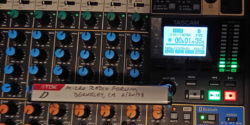For the first time in a while I needed to dip into my dwindling archive of cassette tape airchecks. A couple of tapes immediately caught my eye and spurred me to restart the digitizing project I’ve been working on and off for the last five years. They took me on a fun journey back in time.
A Micropower Radio Forum in 1998
The first is a recording from a “Micropower Radio Forum” in Berkeley, California, which brought together 1990s community radio activists in celebration of the publication of the book “Seizing the Airwaves,” edited by Free Radio Berkeley founder Stephen Dunifer and radical scholar Ron Sakolsky. Recorded in February 1998, I remembered that I actually sourced the audio from an online archive uploaded to the A-Infos Radio Project, one of the first open internet archives for progressive and radical radio programming.
I had recorded these MP3 audio files to cassette in order to play excerpts on my radio show, “Radio Free Conscience,” which aired biweekly on Community Radio WEFT in Champaign, IL from 1996 to 2002. You see, in 1998 we (like most community stations) didn’t have an audio-capable PC in our main studio, nor any digital playback facility. Therefore the simplest way to bring the audio in was on a cassette. (The station would embrace minidisc for digital recording and playback later that year.)
Upon finding this tape I immediately searched A-Infos and found its entry. Unfortunately many early uploads have become dissociated from their database entries, and a half-hour of searching the site and the internet didn’t turn up the original files. That’s why I decided I should go ahead and digitize the tape now.
I had to take some delight in the path this audio took in its journey back onto the internet. Since cassettes were still the dominant amateur recording technology in 1998, there’s a good chance that the original audio was recorded to tape, then digitized to MP3 for distribution on the internet. Then I downloaded it and recorded that audio to cassette. After being broadcast on FM radio – with no known aircheck – it sat undisturbed for nearly 13 years until I again digitized the audio. I have now uploaded it to the Internet Archive.
This program is significant because it captures a moment in time when unlicensed micropower radio stations were going on the air in communities around the US, as an act of civil disobedience against the FCC’s policy of not licensing low-powered stations. The pressure these illegal community stations put on the FCC would help spur the agency to create low-power FM in 2000.
In this particular program you can hear from a principal of San Francisco Liberation Radio, one of several Bay Area micropower stations in operation at the time. Though somewhat well known then, the memory seems somewhat faded now. You can also hear testimony from prominent activists about why the cause of accessible community radio was so trenchant at the end of the 20th century.
Tree Radio Berkeley
The other tape is also from 1998. It’s a 90-minute aircheck of Tree Radio Berkeley, which was an unlicensed low-power radio station that literally broadcast from a tree in a Berkeley, California park for 11 days in November 1998. In this recording you can hear the hosts taking questions from an elementary school field trip below, sending their questions first by yelling, and then later by what sounds like a walkie-talkie. What’s great about this is that you get to hear the organizers explain what they’re doing, and why.
The FCC, aided by federal marshals, had conducted a number of armed raids on unlicensed radio stations that year, which were fresh on the organizers’ minds.
The funny thing is that I can’t remember how I obtained the tape. The recording is very clear and high quality. It almost sounds like it was recorded in-studio rather than from a radio. The handwriting on the tape is not mine, either. But again, I can’t remember who might’ve passed it along to me.
Of course, I also uploaded the Tree Radio Berkeley aircheck to the Internet Archive.
Though unlicensed radio is still very alive, especially in places like Boston, South Florida and the New York Metro area, I think it’s important to remember that the civil disobedience of the unlicensed micropower radio movement in the 1990s helped to fuel what would turn out to be the greatest flowering of community radio in history in the 21st century. It’s a reminder that people and communities can organize for material change that can have lasting impact.



